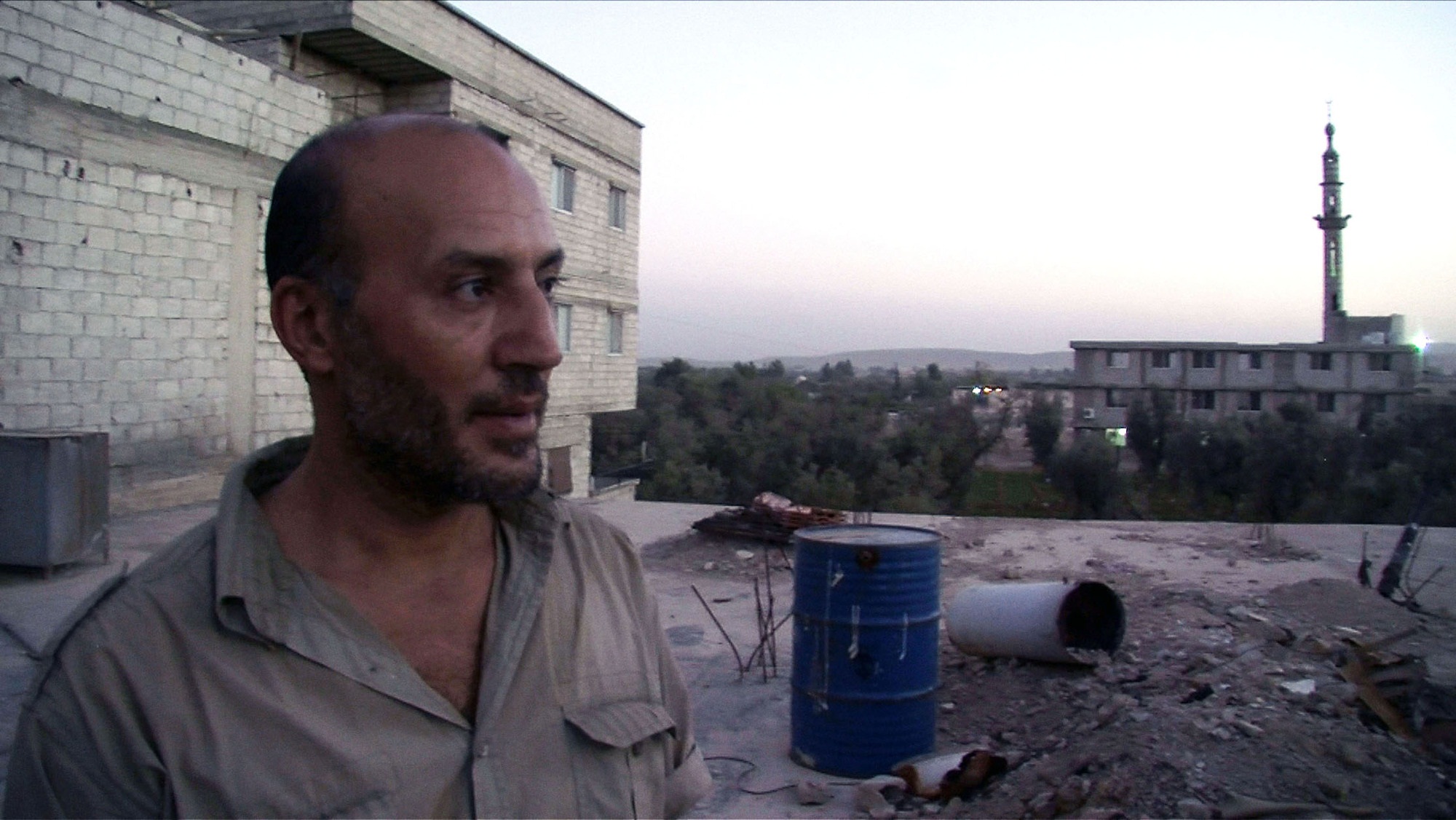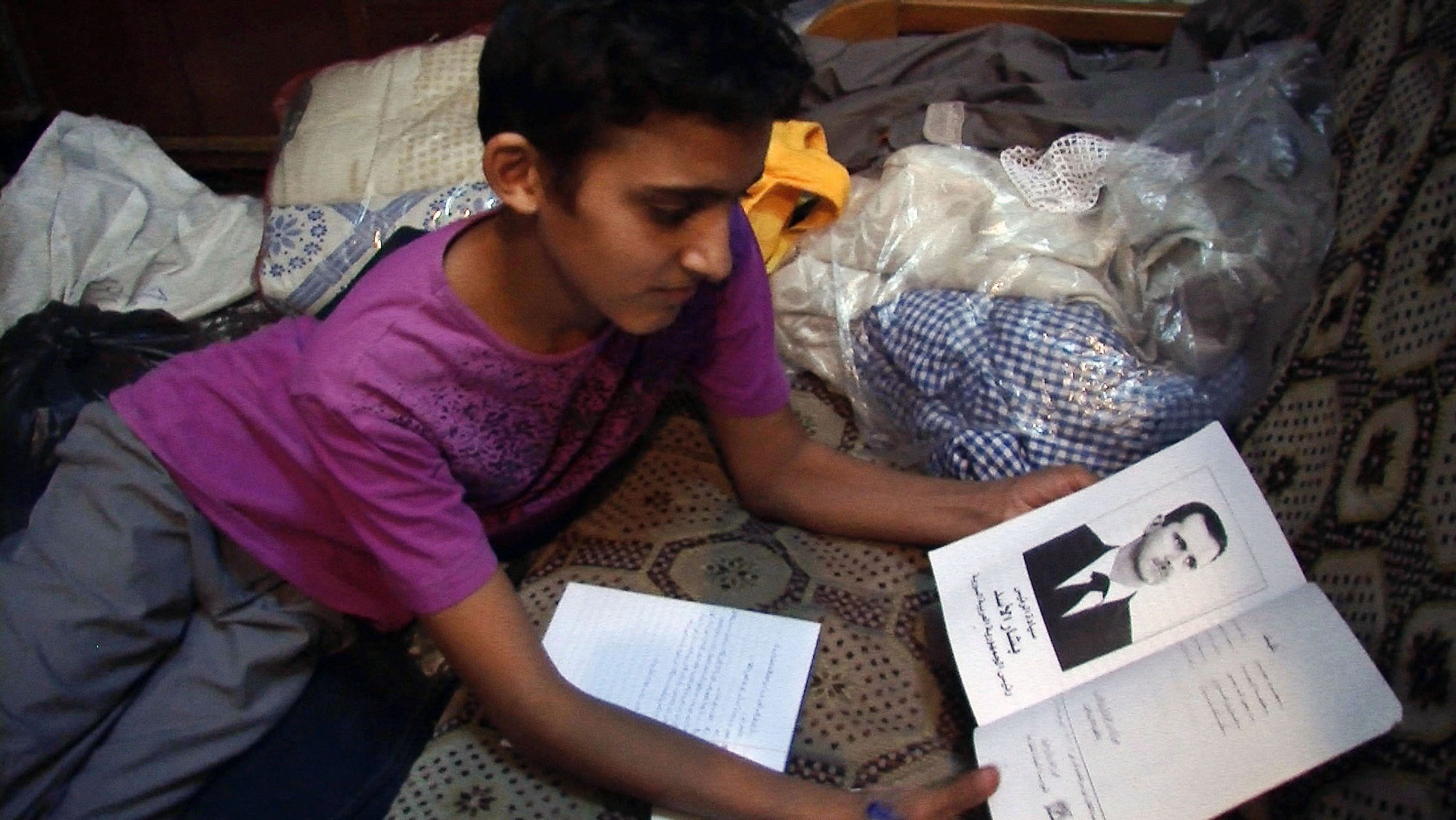Managing the boundaries of closeness in documentary filmmaking can be a complicated issue. Does the documentarist figure only as a fly-on-the-wall observer – or become involved, caught up in the story of his or her subject? Is it possible to maintain a distinction? When, and what is going too far?
All these questions, and more, were in play in Sean McAllister’s outstanding A Syrian Love Story, which has already won the Grand Jury prize at the Sheffield documentary festival and looks set to reap more such honours at other events around the world. His story of a family in discord is bruising viewing throughout: thrown from an unstable life at home in Syria, where prison or worse was never far away for rebel parents Amer and Raghda, they ended up in exile in France, but the apparent advantages of safety that asylum brought did little or nothing to assuage the couple’s demons. The repercussions on their children, for all the huge resilience they showed here, looked devastating.
It might have been titled 'Anatomy of a Marriage' and come straight from the pen of Ingmar Bergman There was a terrible symmetry in how A Syrian Love Story came into being. McAllister arrived in Syria in 2009, 18 months before the beginning of the Arab Spring, when the country looked like it was trying to reinvent itself as the latest edgy holiday destination. We saw him first at the ancient site of Palmyra, which his voiceover narration reminded us had been the location of a notorious torture prison in its time. His minders were happy for him to film the sights, but not ask people questions. He said he was after a “real story”, something gritty – which the minders assumed meant negative, and from their brief at least they were right. He was clear: gritty meant real.
And then in Damascus, escaping on his own, McAllister chanced upon Amer, a man who very much wanted the world to know about his wife, Raghda. “She needs her voice to be heard,” Amer said, and he was there to tell it, since she was in prison, contact with the outside world limited to rare telephone calls to her family. In fact prison had been where this couple met: the first time Amer, a Palestinian activist, saw Raghda, a protestor against the Assad regime, her face was bloodied and bruised from beatings. They communicated through the prison walls.
All this we came to know gradually as McAllister became absorbed within the family home, to a degree that seemed total: filming of A Syrian Love Story lasted five or so years, and the youngest child, Bob, was referring to him as “uncle” before long. We knew nothing about McAllister’s life outside the film, but his engagement within it looked absolute, never more so than in his presence to witness one of the most important early moments, Raghda’s release from prison and reunion with her family. (That was shown in a slow motion scene with, as often in the film, distinct musical accompaniment – such directorial intervention was very much to the fore.)
 How Raghda reacted to the appearance of this foreigner in their midst – not to mention, though it was never quite elucidated, one who must have been living a semi-undercover existence when it came to the Syrian authorities – we never quite saw. But she accepted McAllister into the family as they moved, after the beginning of protests in 2011, from their home in Tartus on the coast to the Yarmouk refugee camp outside Damascus. But the director’s presence would directly impact on their future lives: when McAllister was caught and interrogated by the security police (he was imprisoned for five days), they found the material that he had filmed with the family; that discovery drove them to flee to Lebanon (Amer pictured there, above).
How Raghda reacted to the appearance of this foreigner in their midst – not to mention, though it was never quite elucidated, one who must have been living a semi-undercover existence when it came to the Syrian authorities – we never quite saw. But she accepted McAllister into the family as they moved, after the beginning of protests in 2011, from their home in Tartus on the coast to the Yarmouk refugee camp outside Damascus. But the director’s presence would directly impact on their future lives: when McAllister was caught and interrogated by the security police (he was imprisoned for five days), they found the material that he had filmed with the family; that discovery drove them to flee to Lebanon (Amer pictured there, above).
We saw the dates and locations – 2012, Lebanon; 2013, Paris; 2014, Albi – of McAllister’s subsequent reunions with the family, but the effect was really as if he had never left them. The intimate closeness of the couple who were as much comrades-in-arms as soul-mates, one that had survived the absences and hardships of prison, began to break down before our eyes. It moved the director into a role somewhere between marriage counselor and family therapist.
Raghda was in some way unable to live without the revolution to which she had committed so much of her life, and she slipped away from the safety of Lebanon: McAllister missed that departure, but caught its spirit nicely in a single shot of a cat, Raghda’s independence being somehow akin to that of the animal. Her absence complicated the process of the family receiving asylum in France, though that duly proved their next destination. By the final scene she had slipped away again, this time to the Turkish border town with Syria of Gazantiep and a new role as a cultural-political adviser to the Syrian opposition in exile.
Amer’s reproach, that his wife couldn’t be both Che Guevara and a mother at the same time, sounded so right – yet Raghda was unable to behave otherwise. We can only wonder what was really involved there: an element of PTSD almost certainly, but also the conviction that exile takes you away irrevocably from the reality of your life, as well as just stubborn independence. But how this couple tore the skin off each other in scenes that might have been titled “Anatomy of a Marriage” and come straight from the pen of Ingmar Bergman. We wondered too about McAllister’s presence, exactly how this observing outsider could be let in to something so personal; then the thought came that perhaps, strangely, his presence was actually one of the couple’s remaining links – he became almost their sounding-board. The relationship became particularly tortured after Amer found himself a new girlfriend: as the booze intake rose remorselessly, the only people doing remotely well out of this highly-strung muddle can have been the tobacco industry – both seemed to have a cigarette permanently in their hands.
 McAllister got a level of grittiness that gave a new definition to “real”, but its heart turned out to be far away from the obvious conflict of war. Following a story of this breadth over five years is the kind of project that comes rarely to any documentary filmmaker, and I think he was pondering at times whether he’d been involved too closely, too long: there’s the inclusion of a remark towards the end from Amer, along the lines that, if he’s already finished his film, “So why do you continue, Sean?” We surely have no doubt that McAllister will never, can ever leave this family behind. The intimacy of the scenes in which he spoke with the children on their own was almost unbearable for the impact of their observation on what was happening, unfiltered by adult knowledge or perspective – from the youngest Bob, who was barely walking when we first encountered him, through the piercing intelligence of the middle one, Kaka (pictured above, with his school textbook and its picture of Bashar Assad), and on to the apparently cool detachment of the oldest, the more wordly-wise Shadi.
McAllister got a level of grittiness that gave a new definition to “real”, but its heart turned out to be far away from the obvious conflict of war. Following a story of this breadth over five years is the kind of project that comes rarely to any documentary filmmaker, and I think he was pondering at times whether he’d been involved too closely, too long: there’s the inclusion of a remark towards the end from Amer, along the lines that, if he’s already finished his film, “So why do you continue, Sean?” We surely have no doubt that McAllister will never, can ever leave this family behind. The intimacy of the scenes in which he spoke with the children on their own was almost unbearable for the impact of their observation on what was happening, unfiltered by adult knowledge or perspective – from the youngest Bob, who was barely walking when we first encountered him, through the piercing intelligence of the middle one, Kaka (pictured above, with his school textbook and its picture of Bashar Assad), and on to the apparently cool detachment of the oldest, the more wordly-wise Shadi.
It’s hard to rate this documentary too highly, and for all the spontaneity of emotions McAllister captured, it was also a beautifully crafted film. Did he have his characters permanently microphoned-up? It’s hard to imagine technical interferences within this flow of feelings. The final scene saw him encountering Raghda a last time: she rose to greet him with a smile – was the camera already turned on before she saw him? We were left to wonder: McAllister here, as in his past work, was his own cinematographer. Terence Dunn contributed a score that worked beautifully with its combination of Arab melodies and lamenting cello, strings plucked and played, that could so easily have become intrusive, but didn’t. McAllister added in extra music too, like the jazz medley of “Almost (In Love with You)” that perfectly captured the complicated bond between Amer and Raghda, as well as A Winged Victory for the Sullen, a group that's popping up at some of the most stretched emotional moments in cinema this year. It had just the right effect of colouring our reactions, without directing them.
“Many waves take me to strange places,” Raghda pondered in that final scene over just what had happened to her, and the phrase must certainly apply to all who became involved in A Syrian Love Story. This family is at least still alive, which is more than we can say of so many others caught up in the conflict of which their story is just another micro-episode. For all its pain and uncertainty, for all the conflicts laid ruthlessly bare, it was hard not to find an element of celebration of the human spirit here somewhere. The very final words we heard from Raghda were, “But now I start…”















Add comment